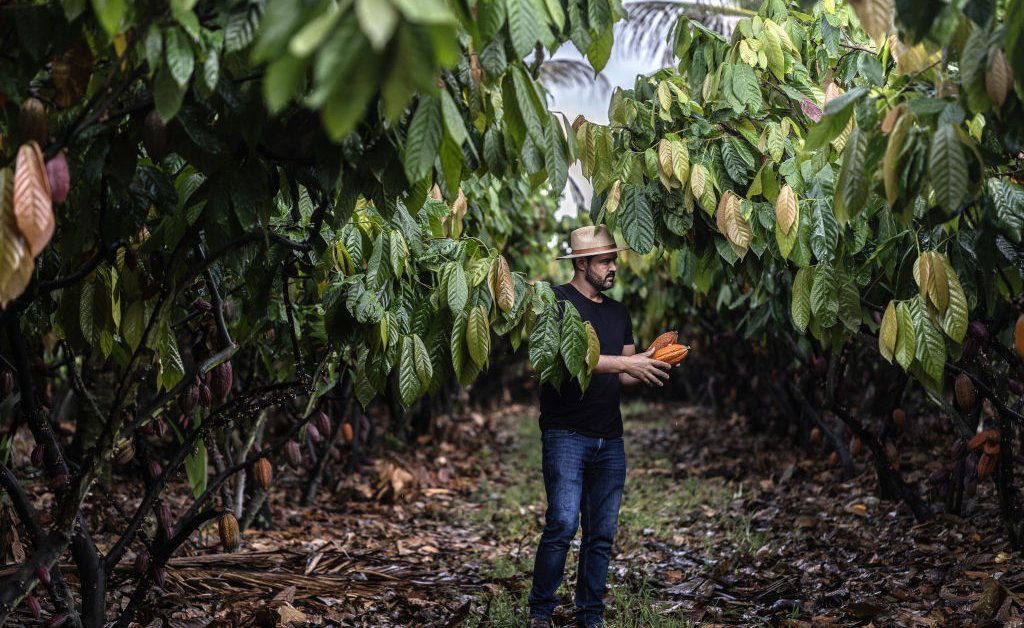Something delicious is happening in Brazil’s Bahia region. Here, where forests were once razed to make room for full-sun cocoa plantations, this corner of Brazil’s Atlantic Forest—one of the planet’s richest yet most threatened ecosystems—is now the site of a quiet agricultural revolution.
Farmers are bringing back cabruca, a traditional system where cocoa trees grow beneath a canopy of native species. The return of shade-grown cocoa is reviving biodiversity, restoring degraded lands, and reconnecting fragmented forest landscapes. The initiative aims to support 3,000 cocoa farmers and restore or improve nearly 1.85 million hectares of cabruca systems, avoiding an estimated 3.7 million metric tons of carbon emissions.
It’s a solution that blends tradition with innovation, and one that’s already proven effective elsewhere. In Côte d’Ivoire, a similar project to promote deforestation-free cocoa production has helped farmers shift from full-sun to shade-grown systems, boosting yields and incomes while restoring degraded land.
Since it began in 2022, the project—funded by the Green Climate Fund and implemented by the Food and Agriculture Organization with the Government of Côte d’Ivoire—has benefited 3,577 people, restored or maintained over 700 hectares of forest, and converted nearly 3,448 hectares of conventional cocoa plots into agroforestry.
The results are tangible: better cocoa beans, healthier forests, and stronger communities. Together, these efforts show that when farmers are given the means to work with nature, they can turn a history of deforestation into a future of regeneration.
This is what smart climate investment looks like: helping farmers prosper and keeping forests standing while cutting emissions at the same time.
Agriculture holds some of the greatest untapped potential to reduce global greenhouse gas emissions in line with the Paris Agreement, yet it remains chronically underfunded. In 2023, forestry, livestock, fisheries, and crop production together received just 4 percent of total climate-related development finance, according to a forthcoming FAO analysis. For a sector so vital to reducing emissions, preventing hunger, and protecting communities from climate extremes, the gap between potential and investment is staggering.
Continuing to overlook agrifood systems is not only inequitable; it’s a missed opportunity to build resilience, mitigate climate change, and secure a safer, more sustainable future for the close to 1.3 billion people whose livelihoods depend on it.
Last year, at COP29 in Baku, countries agreed to a new target: $300 billion a year for developing countries, as part of a broader ambition to scale up total climate finance to $1.3 trillion per year by 2035. But unless a meaningful share of that funding goes to food and agricultural systems, the world will miss both its climate and food security goals.
As countries prepare to gather in the heart of the Amazon for COP30, forests are the natural place to start. They are not just victims of climate change, but one of our most powerful solutions—if the investment is there. Brazil is already showing the way through its new Tropical Forests Forever Facility, which rewards countries for keeping forests standing. The Brazilian government has pledged $1 billion to launch the fund at COP30.
While global deforestation has declined over the past three decades, the world continues to lose more than 4 million hectares of forest annually, according to FAO’s latest Global Forest Resources Assessment—too much to meet climate and biodiversity goals.
Preventing the increasing numbers of forest fires is a critical starting point. But keeping forests intact goes beyond this. It means restoring degraded land and helping the communities who depend on forests build sustainable livelihoods. The best defense against deforestation is to make the land around forests productive and profitable by offering farmers viable alternatives to cutting them down. Every dollar invested in this kind of agriculture delivers multiple returns: lower emissions, greater food security, and stronger rural economies.
What’s true for forests holds true for all food and agriculture: When we invest in agrifood solutions that empower farmers, everyone wins—people, the planet, and the climate. Yet small-scale farmers, who produce a third of the world’s food, still receive only a sliver of global climate finance. Unlocking their potential is one of the smartest, fastest ways to adapt to climate change, cut emissions, and feed a growing population.
Restoring degraded land offers similar payoffs. In Mongolia’s eastern steppes, an initiative implemented by the Food and Agriculture Organization of the United Nations is helping farmers revive more than 11,000 hectares of cropland through no-till farming and intercropping—restoring productivity while protecting ecosystems. Some 845,000 hectares of pasturelands are resting and recovering from overgrazing while herding communities transform shorn cashmere into sustainable fiber for luxury markets. Healthier soils and new livelihoods are boosting incomes for tens of thousands of farmers and herders, while cutting an estimated six million tons of carbon emissions.
We know investing in more resilient food systems works. What’s missing is scale. Too often, food and agriculture are viewed as high-risk and low-return, a misconception we know how to change. Smarter, more granular monitoring systems can help direct funding to small farms, giving them access to the emerging global carbon market. Meanwhile, countries need support to build Paris-aligned, investment-ready pipelines that channel climate finance where it’s needed most. With better data, clearer incentives, and stronger policy frameworks, we can ensure climate finance finally reaches those working closest to the land, unlocking the full potential of food and agriculture to drive climate progress.
Climate finance that supports agriculture delivers triple dividends for mitigation, adaptation, and food security. But when the sector is overlooked, the world forfeits its best chance for lasting transformation.
COP30 must be the moment when food systems move from the margins to the center of climate action. As the cocoa farmers of Bahia are showing, supporting those who work the land is the surest way to secure the planet’s future.
The post What Brazil’s Farmers Can Teach the World About Climate Action appeared first on TIME.




